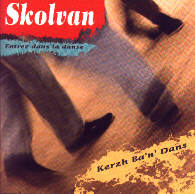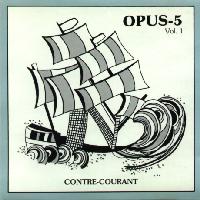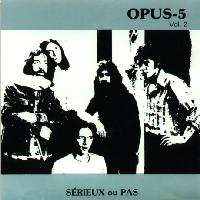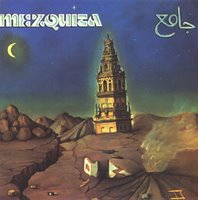
This is the best review (by Scott "Sid" Somers) ever writtenof the Monk's Holy Grail "Black Monk Time", I want to share with youThe First Time Is Always Special (Especially When The First Time Is Monk Time!)"Was it fun for you?"
OH MARIA!!! WAS IT EVER!!!
As a frequent visitor to the "Rock & Roll Hall Of Fame Inductees Forum", a message board where any and all types of rock music are discussed, fought over, and generally hyped, I tend to dismiss those fans who continually rant "I think this band is great!" or "that group was the best ever!", as examples of their own personal taste. As a lifelong fan of rock & roll I've either heard the music of those artists and long ago made up my mind whether such claims are worthwhile, or, if I haven't actually heard them at least I know of their existence and to which branch of the tree of rock & roll those artists belong, along with a basic understanding of their importance in the scheme of things.
So my interest was aroused by several recent forum posts regarding The Monks, their 1966 album "Black Monk Time", and the recent reunion of the band in New York City after 32 years apart. The Monks? Who were The Monks? Here was a band I had never heard anything about before. Zip! Zilch! Nada! Nil! I made a mental note to check this group out sometime in the future.
As luck would have it, while browsing my local cd store the following weekend, I found a copy of "Black Monk Time". The original album cover was a simple and stark design, completely black and displaying only the band's name and album title. On first impression it instantly reminded me of "The Beatles", the 1968 release better known as "The White Album".
I should mention here that The Beatles are my favorite band and I consider myself quite obsessed with them, having read numerous books about their history and making my own pilgrimage to Liverpool and London to see the sites for myself. Many of these books make the claim that The Beatles were the first to release an album with a completely blank cover, and while technically true, I can't help but wonder if this idea was not first used on The Monks "Black Monk Time", preceeding The Beatles by two years!
The back cover had a series of b&w pictures of the band in various shots, some of them playing their instruments, some of the group just fooling around, but one in particular caught my eye. "WHAT IS WRONG WITH THAT GUY'S HEAD? Why has he got a huge patch on the top of his head shaved clean? What's that all about?!!".
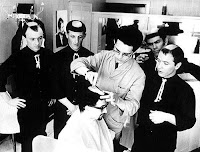 Curiosity got the better of me.
Curiosity got the better of me.
I bought it.
I played it.
"IT'S MONK TIME!" "IT'S MONK TIME!" "IT'S MONK TIME!"
I have not been the same since!
I have been changed!
Not since The Sex Pistols 1977 "Never Mind The Bollocks..." has an album so utterly shaken my view of what rock & roll was, and is, all about!!!! I could not believe what I was hearing. Was this really 1966? Impossible! This music was ten years, at the least, ahead of its time. This album sounds like something that could have been released in the late '70s or early '80s. Hell!!! This album sounds like something that could have been released today!!! Here was rock & roll like I'd never heard it before. It was scary! It was wacky! It sounded so fresh, so vital, and so full of energy. And my God, what energy! Energy at times angry, sometimes bordering on rage, but most of all this music screamed FUN!!!
 A big smile crossed my face, the kind of smile you get
A big smile crossed my face, the kind of smile you get
when you discover a new pleasure that you've never experienced before. Here was a long lost gem buried in that mountain of Rock. Here was a forgotten treasure. The Monks "Black Monk Time" may be THE BIGGEST SECRET IN THE HISTORY OF ROCK & ROLL!!! But the word is now out, and spreading quickly! (Hey, if a Cheesehead from the Frozen Tundra of Green Bay, Wisconsin found The Monks it won't be long until the rest of the world does too!)
Opening the cd gave me another surprise. There, staring back at me, was the group photo of The Monks, all dressed in black, with white rope ties around their necks, and EACH ONE WITH A BALD PATCH SHAVED OFF THE TOP OF HIS HEAD!!! WHOA! I would later discover that such a haircut is called a "tonsure", usually done as a sign of entrance into a monastic state. Well, that fit. Here was a group image that went far beyond The Beatles moptops, or anybody else that I can recall from 1966. A radical group "look" that was unequaled thematically until perhaps the 1974 debut of KISS. Again, The Monks were ahead of their time.
But what really matters is the music.
AND HERE THEY ARE, THE ANTI-BEATLES!!!

I find it interesting that both The Beatles and The Monks honed their musical skills at some of the same notorious nightclubs of Hamburg's Reeperbahn red-light district. I have often wondered what The Beatles music would have sounded like had they not surrendered to becoming suit-and-tie wearing MopTops, and instead kept to their Hamburg beat group roots as a pill-popping, hard-drinking, band of black-leather-clad teddy boys. Listening to The Monks "Black Monk Time" gave me a small peek at what I've always imagined that "beat music" might have been like. But any similarities end there.
Perhaps the nearest The Beatles could have come to The Monks "sound" would have been if "I'm Down" had been played like "Helter Skelter". The frantic beat and distortion on "Black Monk Time" at times reminds me of The Stooges, The Ramones, and The Sex Pistols. The sometime quirky song arrangements bring to mind The B-52's and Devo, while the ping-pong choruses are reminiscent of The Cars. And yet, nothing I have heard before sounds anything like The Monks! The Monks are unique! The Monks "sound" is proto-Punk! New Wave is definitely neo-Monks!
By 1966 The Beatles were adding more and more layers of instrumentation to their already complex recording technique. The Monks, calling themselves "anti-Beatles", took a minimalistic approach to their music, stripping away most of the melody and precision, and instead replacing it with a heavy drum beat and massively distorted rhythm. MY GOD! YOU WILL NOT BELIEVE THE DISTORTION!!!! THIS CANNOT BE 1966! Heavy distortion on the guitar and the bass. THE BASS!!! And why not add a banjo too? WHAT?!! A BANJO??!! Yep, that's
right! In their search for a more primitive and simplistic sound not only did The Monks strip down the drum sound to an incredibly raw pulsating beat, but in an effort to double that rhythm effect they added a banjo too! IT'S INSANE!! WHO WOULD EVER HAVE THOUGHT OF THAT?!! The Monks, that's who! It works BRILLIANTLY! It was GENIUS! Finally, bubbling up, over, down, and underneath this huge mass of distorted guitars, clacking banjo, and thud
ding drums is a wonderfully frenetic organ. Top it off with great sounding vocals and ,all in all, I have rarely heard anything so fantastic as The Monks "Black Monk Time"!
While The Beatles were beginning to lead the rest of us toward 1967's "Summer Of Love", expressing a utopian message in 1965's "The Word" and escapism in 1966's "Tomorrow Never Knows", The Monks set their sights firmly upon reality. No peace, love, and understanding from these guys, they were going to tell it like it really was (and still is)! The Monks lyrics reverberate with ANGER!!! These guys are pissed off!!! No further proof is needed than the album's opening song, "Monk Time", in which the band defiantly declares its stance, "....you know, we don't like The Army, what Army?, who cares what Army!, why do you kill all those kids over there in Viet Nam?, mad Viet Cong!, my brother died in Viet Nam!".
But here is the strange thing, far from alienating you, in some strange way The Monks wacky song interpretations perfectly describe what a crazy world we all live in, then and now. It's that unspoken recognition that you feel, that "you too know what they know", that this world may be insane but with the music of The Monks this world can also be FUN!
That realization will bring a smile to your face! (Either that, or you've listened to The Monks "Cuckoo" one too many times!)
Want some fun? Go out immediately and find The Monks "Black Monk Time".
The Monks-"Monk Chant"
The Monks-"Monk Time"
Keep Listening
Links in Coments
 Zingale (from the word 'sing'. Many people thought that they were named after the Hebrew slang word for a 'grass joint') was formed in 1974 by David Bachar and Yonathan Stern. They joined in Barak, Tamir and Shanan who were session/studio musicians. This line-up recorded in 1974 two tracks (tracks 10-11 from the CD) that were presented to the radio but received no attention at all. The group realized very soon that the musicians had a real chemistry between them. Jacob Bachar who was the manager thought the group had a real international potential and he got 'Kolinor Studios' in Israel and 'Decca Records' in Europe (who's president was personally interested and involved) to invest in the group. Two new members joined - Brower and Weiss. The group started working on an English LP. By the end of 1975 the recordings were completed and the group was preparing to go on a European tour to be sponsored by 'Decca.' Unfortunately a message came in that Decca's president had a heart attack and the whole process was postponed. In the meantime, the group had started working on new Hebrew material and was signed by ;Hataklit; in Israel. During 1976 and 1977 they had recorded new tracks in Hebrew, some of which were sent to radio stations (tracks 12-15). By that time the group had given up hope of an international career, and they decided to release their English record in Israel. In 1977, 'Peace' was finally released. The LP was released in a small edition and had become an extremely rare & expensive collectors item around the world. Soon after the release of the LP, the group had split up due to arguments on the recordings and mixes of the Hebrew album (which were never actually finished) and due to the fact that Stern and Tamir had left the group in favor of their growing interest in religion. (http://www.proggnosis.com/)
Zingale (from the word 'sing'. Many people thought that they were named after the Hebrew slang word for a 'grass joint') was formed in 1974 by David Bachar and Yonathan Stern. They joined in Barak, Tamir and Shanan who were session/studio musicians. This line-up recorded in 1974 two tracks (tracks 10-11 from the CD) that were presented to the radio but received no attention at all. The group realized very soon that the musicians had a real chemistry between them. Jacob Bachar who was the manager thought the group had a real international potential and he got 'Kolinor Studios' in Israel and 'Decca Records' in Europe (who's president was personally interested and involved) to invest in the group. Two new members joined - Brower and Weiss. The group started working on an English LP. By the end of 1975 the recordings were completed and the group was preparing to go on a European tour to be sponsored by 'Decca.' Unfortunately a message came in that Decca's president had a heart attack and the whole process was postponed. In the meantime, the group had started working on new Hebrew material and was signed by ;Hataklit; in Israel. During 1976 and 1977 they had recorded new tracks in Hebrew, some of which were sent to radio stations (tracks 12-15). By that time the group had given up hope of an international career, and they decided to release their English record in Israel. In 1977, 'Peace' was finally released. The LP was released in a small edition and had become an extremely rare & expensive collectors item around the world. Soon after the release of the LP, the group had split up due to arguments on the recordings and mixes of the Hebrew album (which were never actually finished) and due to the fact that Stern and Tamir had left the group in favor of their growing interest in religion. (http://www.proggnosis.com/)


